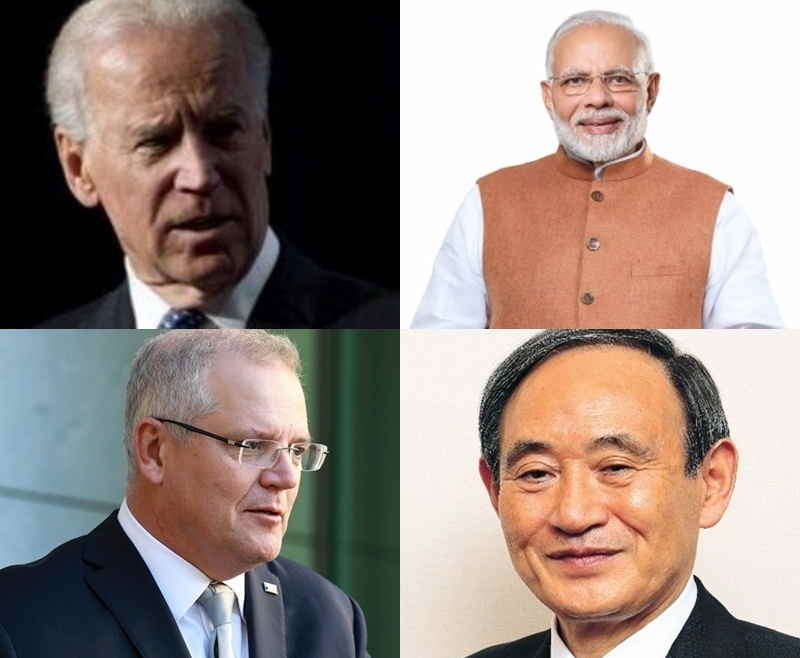
By Atul Aneja and Mahua Venkatesh
Friday's first summit of the Quad grouping comprising India, the United States, Australia and Japan is amplifying India's "strategic autonomy," which nails New Delhi's policy of simultaneous engagement with countries belonging to rival camps.
While China will be the elephant in the room during the first Quadrilateral Security Dialogue at the highest level, India will continue with its selective, cautious and calibrated engagement with Beijing, so long as it promotes New Delhi's core national interests.
However, with the disengagement with China in eastern Ladakh far from complete, India is expected to adopt a cool and pragmatic approach towards Beijing, especially till the time China takes practical steps to address Indian key concerns, including concrete moves to settle the border and dropping its resistance to India's inclusion in the UN Security Council as a permanent member. India is also looking for concrete steps that China has reversed its Middle Kingdom mentality of self-assumed superiority over fellow civilizational states and recognise New Delhi geo-cultural influence in Asia.
Also read: Major geopolitical development if India aligns more closely with Quad grouping: US
Nevertheless, India will dialogue with China in international fora such as the Brazil- Russia- India- China- South Africa (BRICS) grouping.
“BRICS as a group has a lot of relevance when it comes to economic cooperation notwithstanding the fast-changing geopolitical contours. It is important to push Quad but it is also incorrect to see it as anti-China. BRICS has a different orientation from Quad but both are extremely relevant,” Narendra Taneja, energy expert and spokesperson of the BJP said.
A government official said that the focus to boost QUAD should not suggest that India wants to disengage itself from other groupings, where it is a lead player.
“Not just the big groups, India will also aggressively push for its Neighbours’ First policy, in which countries like Bangladesh, Bhutan and Nepal will play a major role. New Delhi’s thrust on its neighbours shows that it is keen to take the smaller countries with which it shares its borders along while it engages with the so-called big groups,” Joyeeta Bhattacharjee, senior fellow at Observer Research Foundation (ORF) said.
India and China
Sources also said that New Delhi has not taken any knee jerk reaction in terms of its foreign policy despite the rising anti-China narrative.
Trade between India and China have remained steady, despite the political turbulence in the relationship. An ORF report published last month noted that China’s share in Indian imports for intermediate goods, capital goods, and final consumer goods is 12 per cent, 30 per cent and 26 per cent respectively. India depends on China in many key industries from electrical machinery and appliances to pharmaceutical drug active pharmaceutical ingredients (API), it added.
Also read: Quad summit likely to give big push to India-made vaccines in war on Covid-19
Yet, Ashwani Mahajan, national co-convenor, Swadeshi Jagran Manch, however said that India must tread with caution when it comes to expanding economic relations with China.
“While BRICS is important and we must continue to engage with the members, we must also ensure India is in a position to attain self -sufficiency. China is now in the spotlight and more and more nations are registering their concern,” Mahajan said.
Analysts also point out that India needs to be cognizant, and factor in its bilateral relationship with China, the growing international pressure on Beijing on account of its poor Human Rights record.
China is feeling the heat for its treatment towards the Uighur Muslims. Though it signed the Comprehensive Agreement on Investment (CAI) with European Union, many countries have raised voices against Beijing for gross violation of human rights.
US President Joe Biden has indicated that the broad contours laid in relation to Beijing by the previous Donald Trump regime would continue to remain in place, which has rattled China.
“If we don't get moving, they are going to eat our lunch,” Biden even told the senators just after taking charge.




















